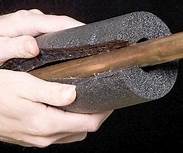Preparing Your Home for the Colder Months
Now that the warm summer months are behind us, it’s time to prepare for
winter. Regardless of whether you expect to see sub-zero temperatures this
season or you live in one of the warmer climates, preparing your home for colder
weather can save you money and hassle this winter. So before you dig out your
fall sweaters, take a weekend and prepare your home for the cold weather to
come.
Save Energy
Fall is a great time to seal drafts in the home which can suck the energy out. Check
around doors and windows and replace worn weather stripping and caulking. If
you use your fireplace for warmth during winter, this is the right time to have the
chimney cleaned and checked for safety. Arrange a furnace tune-up complete
with replacing the filter and vacuuming the vents to make sure you are warming
your home efficiently.
Outdoor Tasks
Before the chill turns to freezing, head to the yard to winterize the exterior of
your home. Check gutters for clogged leaves and other debris and examine the
roof and siding for any repairs which could create leaks or drafts in the cold. If the
gardening season is at its end, drain water from outdoor faucets and garden
hoses. Make sure the sprinkler system is off and reinforce any exposed pipes
which could burst with the cold.
Fall is here. Along with the smell of baking and falling leaves, you can ensure your
home is ready for winter by taking a few steps now to prepare. Save energy and
the hassle of an unexpected repair by getting some routine maintenance done
before the cold months come.
Here are a few easy steps to ensure your home is properly winterized:
1. Doors and Windows- Is cold air sneaking into your home through your doors and windows? You can make sure that all the weatherstripping is in place and you could even help by purchasing draft stoppers. Caulking your windows or purchase a plastic window insulation kit to keep out the cold chill.
2. Gutters-Cleaning your gutters before winter sets in can help by having a combined build-up of leaves, heavy ice/snow causing unwanted damage. It is always a good idea to routinely check the build-up in your gutters on your home so the water can flow quickly.
3. Flip Ceiling Fan Blades-YES! This helps! By simply switching your ceiling fan blades to run clockwise will push the warmer air down to the ground, saving you a little bit of extra money on that heating bill.
4. Change Furnace Filters-During the heating season it's important to change out your dirty filters. If they are not changed out regularly it can restrict airflow and increase your energy demand.
5.Protecting your Pipes-To minimize the possibility of water freezing in your plumbing pipes, wrap each pipe in a blanket of foam insulation.
6. Turn off Exterior Faucets- Undrained water in pipes can freeze, which will cause pipes to burst as the ice expands, start by disconnecting garden hoses and draining the water that remains in the faucet. An added protection is purchasing a Faucet Cover.
Almost two-thirds of American adults live in a home that needs weatherization. Among the people who do weatherize their home, 54% do it to save money on their energy bills. 44% do it to make the temperature in their home more comfortable and 22% do it to be energy efficient. Whatever your reasoning is it's best to be prepared for a cold winter and prepare your home before the snow and ice begin to fall. Your home will thank you and so will your wallet.
























